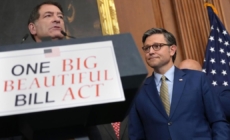-
Sky News reporter describes talking with Air India crash survivor - 9 mins ago
-
2026 World Cup: Shaboozey, FOX Sports kick off one year to go from soccer’s biggest event - 20 mins ago
-
‘How To Train Your Dragon’ Director Defends Live-Action Remake Changes - 26 mins ago
-
Photographer captures Sen. Alex Padilla’s takedown - 34 mins ago
-
Candace Cameron Bure, 49, shares tropical vacation photos in string bikini - 37 mins ago
-
GOP tax bill could cost low-income Americans $1,600 per year, CBO says - 42 mins ago
-
Brother of Air India plane crash survivor concerned for third sibling, missing presumed dead - 58 mins ago
-
Map Shows 10 States Hit Hardest by Surge in Home Insurance Prices - about 1 hour ago
-
Ranking the NFL’s best marriages between QBs and their teams - about 1 hour ago
-
Dodger Stadium Express to run despite curfew restrictions - about 1 hour ago
Crypto Regulation: Biden vs. Trump—A Regulatory Rumble in the Digital Arena
Regulate or innovate?
In our polarized political system, even regulation of the multibillion-dollar crypto industry seems to be a tale of diametrically opposed approaches. As ever, however, the best way may lie in picking a careful path between the extremes angrily voicing their opinions.
Certainly, the Trump administration’s approach to digital assets has marked a dramatic departure from the Biden era’s enforcement-heavy strategy using existing legal structures that many in the crypto industry do not believe apply. Even the president himself launched a meme coin called $TRUMP on the Solana blockchain, generating nearly $100 million in trading fees. It’s hard to imagine any other president in U.S. history doing anything remotely similar. He also signed an executive order on January 23, 2025, aimed at establishing a “crypto strategic reserve” and enhancing U.S. leadership in digital assets.
Previously, startup executives in Silicon Valley looked longingly at easier and more welcoming jurisdictions for their crypto ventures, some moving across the Atlantic to Switzerland or the Pacific to Singapore. Now, with the Trump administration’s actions relating to crypto regulation, the U.S. is looking more attractive again.
AP Photo/Mark Humphrey, File
The shift represents more than mere policy preference—it signals a fundamental rethinking of how America should position itself in the rapidly evolving blockchain economy.
Under the Biden administration, Securities and Exchange Commission Chair Gary Gensler pursued what critics labeled “regulation by enforcement,” applying existing securities laws to cryptocurrency markets that many did not believe applied to those markets without providing clear, prospective guidance. This approach treated most digital assets as unregulated securities subject to traditional registration requirements, creating uncertainty that many industry participants viewed as stifling innovation. Gensler’s SEC brought numerous enforcement actions against crypto companies, arguing that existing financial laws were sufficient to govern digital assets without new regulatory frameworks.
In stark contrast, Trump’s SEC chair, Paul Atkins, advocates for more innovation and clearer, more predictable regulations specifically tailored to cryptocurrency markets. His approach emphasizes collaboration with industry to create a framework where the rules are clearly known as the primary regulatory tool rather than aggressive enforcement based on applying existing laws, which many industry insiders described as pounding a square peg into a round hole.
The philosophical divide extends beyond enforcement strategy to fundamental questions about innovation and financial inclusion. The Biden administration’s cautious stance reflected concerns about consumer protection and financial stability, treating crypto with skepticism inherited from traditional banking oversight. Critics argued that this approach ignored crypto’s potential to democratize finance by offering alternatives to conventional banking systems and providing individuals greater control over their financial assets.
However, while critics of Trump’s crypto policy assert that it will cause more issues because of reduced federal oversight, Adkins has said there will be regulations, but the regulations will be tailored to the crypto industry making it a square peg fitting in a square hole. A key factor to this new regulation will be whether the new federal crypto regulations will “preempt” state laws—meaning that federal law trumps state law—which is key to making the crypto regulations effective.
Don’t forget that the U.S. has 50 states and many have their own laws and regulations about investments. Without “preemption,” cryptocurrency companies will be subjected to a series of regulations and registration requirements with the federal government and many state governments that may increase the costs of the crypto market and make it more convoluted and complex to operate. For example, crypto companies operating in New York will remain subject to New York’s “BitLicense” regulatory and licensing regime. California also recently enacted and is now implementing its Digital Financial Assets Law, which will similarly require many crypto companies to obtain a license. Many states’ money transmission licensing laws will also continue to apply to crypto companies.
In addition, state attorneys general and securities regulators may attempt to fill a perceived gap in crypto-related enforcement. New York Attorney General Letitia James has been particularly active in bringing enforcement actions against prominent crypto companies, and it’s hard to imagine the financial markets without New York. This state enforcement activity will continue, and is likely to increase, during President Trump’s term, particularly in states that oppose many of his ideas.
Consumer advocates worry that Trump’s regulations could lead to a chaotic Wild West, where scams and schemes could run amok. Fraud and scams and shady characters have long haunted the financial system. Charles Ponzi, whose name is eponymous with fraud, and Bernie Madoff were able to commit frauds without crypto and more frauds are committed in U.S. dollars than crypto. Why? Just think of what the famous bank robber Willie Sutton said back in the 1930s: “because that’s where the money is”!
The answer is not and has never been to close banks, shut the stock market or cease using U.S. dollars. Similarly, it is not to forbid grandparents from investing in crypto.
The answer is as it always has been: to encourage innovation, regulate with the right balance of looseness and control with reasonable regulations that do not burden innovation or oppress the industry while simultaneously permitting a hard crackdown when someone gets out of line.
America will not win if its markets are too loose and unregulated. But American will also not win if all the innovation is driven offshore and Singapore, Switzerland and Shenzhen become the financial capitals of the world.
This is a debate about our future and as such it is too important to get swept up in the black and white of political polarization. We need to work together to decide whether America leads or follows in the next phase of financial innovation, and how exactly we can do that best.
Bryan Sullivan is a leading attorney who has represented high-profile clients in entertainment, intellectual property and corporate investments.
Source link






























